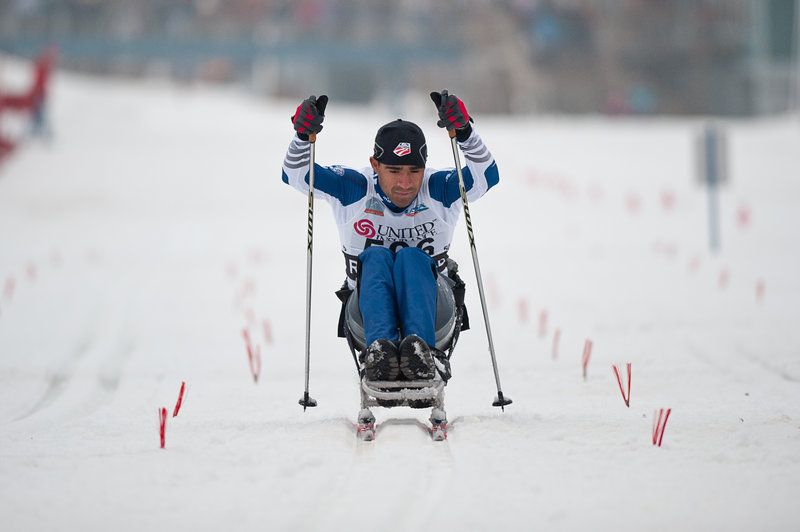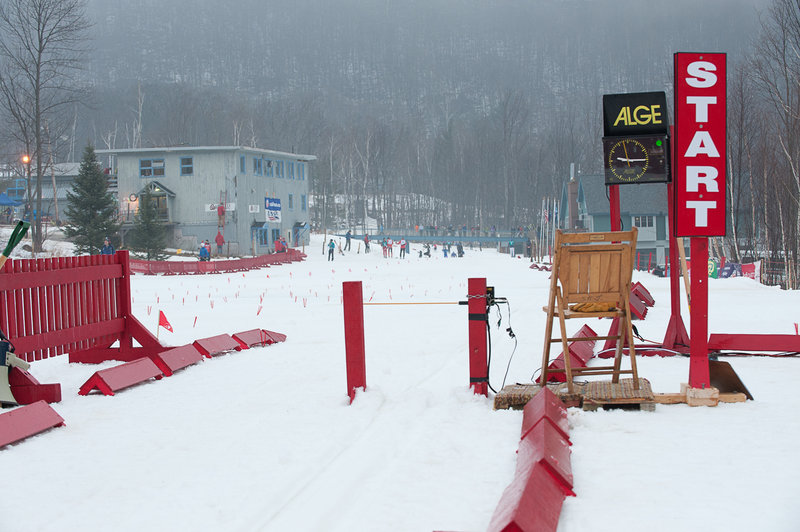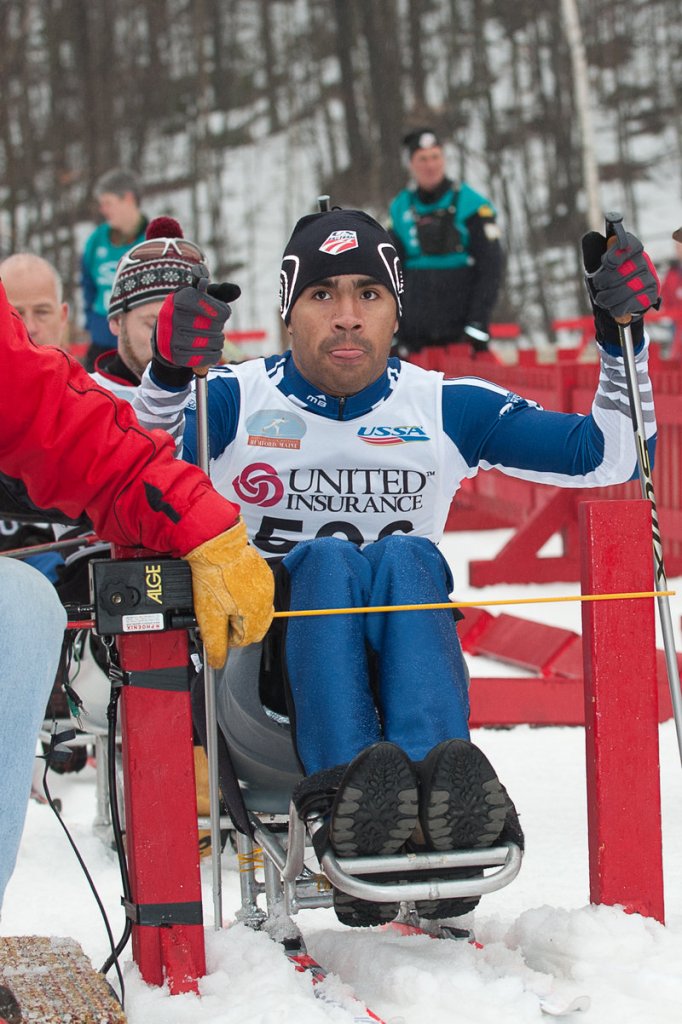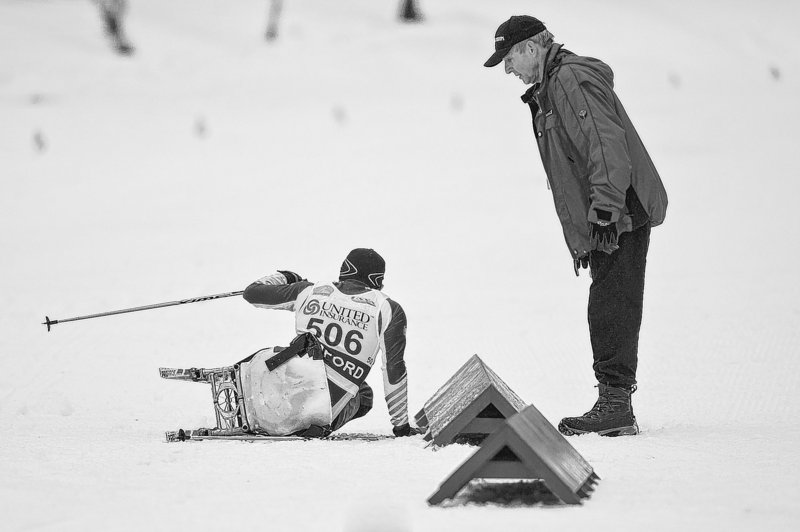RUMFORD — As a red-jacketed volunteer counted down “3 … 2 … 1,” Marlon Shepard leaned forward, dug his ski poles into the slick, hard-packed snow and set off through a light drizzle.
He quickly gained speed but just as quickly lost it, tipping over in his molded seat attached to two Nordic skis after running into a red wooden V-board meant to mark the edge of the course.
After righting himself, Shepard took off again, only to take another spill closer to a cluster of spectators peering down from an overhead bridge attached to the lodge at Black Mountain as the 2011 U.S. Cross Country Ski Championships got under way at the Chisholm Ski Club on Sunday morning.
Not the kind of nationals debut Shepard was hoping for. Then again, he’s no stranger to overcoming adversity.
A 20-year-old Greely High graduate, Shepard is a T4 paraplegic. Where once he played baseball, basketball, lacrosse and soccer and ran track while growing up in North Yarmouth, he now uses a wheelchair, a hand cycle and a sit-ski.
Three-plus years ago, on a group excursion to Italy, he fell from a balcony — “I happened to have one too many drinks,” he said — and has learned to live without the use of his legs or many of the muscles below his chest.
“I snowboarded, but I had never been on skis,” Shepard said. “The first time I ever thought about doing Nordic skiing was after my injury.”
Shepard — whose father, James Shepard-Kegl, is a lawyer and pilot and mother, Judy Shepard-Kegl, is a University of Southern Maine linguistics professor — is one of eight men and three women competing this week in the adapted skiing division of the Nordic national championships. Five of those athletes, including Shepard, are connected with the University of New Hampshire’s Northeast Passage program of therapeutic recreation.
“Our mission is barrier-free worlds and giving people the tools and the opportunity to create the kind of life they want to live,” said Cathy Thompson, the adaptive Nordic ski coach for Northeast Passage and a former able-bodied skier at UNH herself.
Thompson met Shepard after his injury, when he was still at Greely High. During a bike ride, she asked him about a winter sport.
“I don’t know,” came the reply. “I’ve been trying a lot of sports. I just want something where I feel like I’m tired and I’ve accomplished something.”
Thompson broke into a wide smile and said, “I have the sport for you.”
Double-poling over the snow while strapped aboard a molded plastic seat attached by aluminum tubing clipped into a pair of Nordic skis isn’t for everyone. Even slight changes in elevation present serious challenges, whether it be the incremental, earn-every-inch uphills or the precarious, drag-your-hand-in-the-snow-for-balance downhills.
“Just like any other sport, you have to train — even when you don’t want to, you still have to,” Shepard said. “From a technical aspect, the toughest part is turning. If you have the brute strength, that can make you go straight, but you need that ability to adjust direction.”
Shepard and his Northeast Passage teammates train with the UNH ski team when practical, such as in the weight room.
He started college at Suffolk University before transferring to New Hampshire, where he is majoring in nutritional sciences with an eye toward graduate school in physical therapy.
“That’s my future profession, hopefully,” he said.
For the immediate future, adaptive skiing offers the possibility of world travel and potential for the 2014 Paralympics in Sochi, Russia. Three U.S. Nordic Paralympians retired after the Vancouver Games, leaving only two veterans competing this week in Rumford.
Andy Soule, 30, of Texas won Sunday’s adaptive men’s sprint competition, and Sean Halsted, 40, of Idaho was second. Soule won a biathlon bronze medal in the Vancouver Games, and Halsted was featured in a McDonald’s commercial during the event.
“I met Marlon two summers ago at a development camp in Park City, Utah,” said Soule, a veteran of the war in Afghanistan who lost his legs in a land mine explosion. “We could immediately see potential in him.”
As an able-bodied runner, Shepard preferred sprints, nothing longer than 400 meters. As a sit-skier, distance is more to his liking. He’s scheduled to race a 15-kilometer event Wednesday and a 10-kilometer one on Thursday.
On Sunday, he recovered from his morning misfortunes and remained upright throughout an afternoon sprint of 1400 meters to place sixth among the eight men.
“It was a lot better than the first race, no slips and no spills,” Shepard said. “But I wanted to be at least among the top four.”
Regardless of his performance this week, Shepard has been invited to compete in a World Cup event in Germany later this winter to see how he performs on an international stage.
“Andy and Sean, they’re living the dream,” said Greg Rawlings, formerly head of the U.S. Nordic Paralympic team, who is still involved in the program. “Hopefully, the rest of them, including Marlon, do that. It can’t be a hobby sport. … You don’t do it for two years and stand (on the podium) at the Olympics. It’s going to take guys eight years to be competitive.”
Reach that stage, however, and the rewards are many, said Rawlings, a Maine Winter Sports Center alumnus.
“In the long run, if he’s kicking butt, he’s going to go to some amazing places,” Rawlings said. “France, Germany, Austria, Switzerland, Norway, Sweden, Finland. There are lots of chances for travel and racing on the most amazing venues in the world.”
Staff Writer Glenn Jordan can be contacted at 791-6425 or at:
gjordan@pressherald.com
Copy the Story Link
Send questions/comments to the editors.







Success. Please wait for the page to reload. If the page does not reload within 5 seconds, please refresh the page.
Enter your email and password to access comments.
Hi, to comment on stories you must . This profile is in addition to your subscription and website login.
Already have a commenting profile? .
Invalid username/password.
Please check your email to confirm and complete your registration.
Only subscribers are eligible to post comments. Please subscribe or login first for digital access. Here’s why.
Use the form below to reset your password. When you've submitted your account email, we will send an email with a reset code.